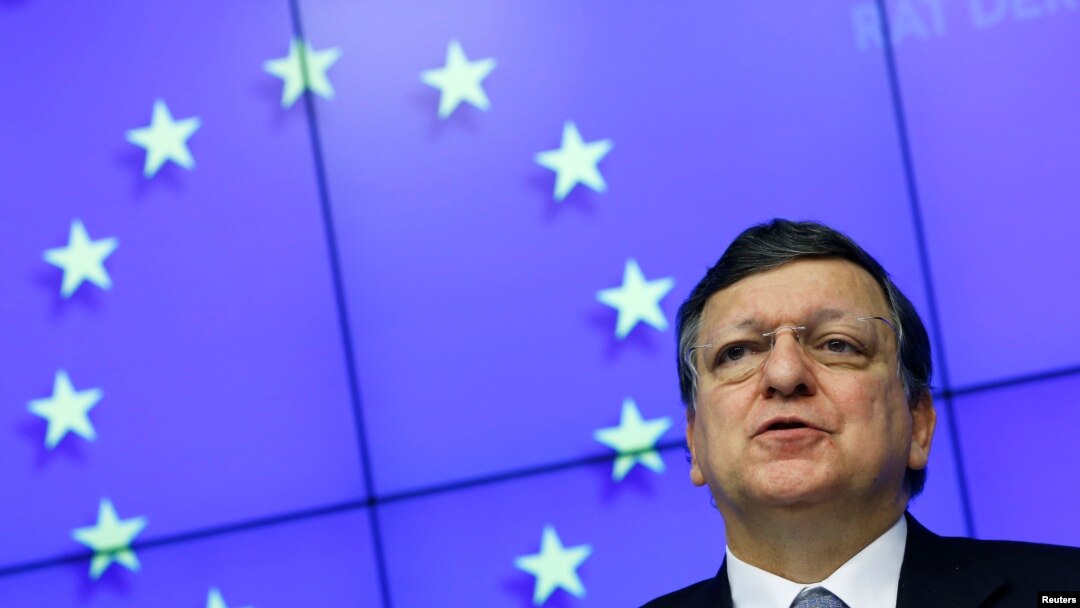FLORENCE, ITALY —
European Union countries are struggling to agree on the approach to take on the crisis in Ukraine, despite broad condemnation of the actions of Russia, outgoing European Commission President Jose Manuel Barroso said on Friday.
Barroso, who is due to step down after 10 years in office, said the Ukraine crisis was the biggest threat to security in Europe since the fall of the Berlin Wall with greater potential for destabilization than the Balkan wars of the 1990s.
He said European countries had decided to support Ukraine and to show that Russia's actions had to have consequences but he said settling on a united response was “still a work in progress” given different views by EU member states.
“And this, let's be honest, this is the issue,” he said.
EU countries have moved slowly towards agreeing a tougher line on applying sanctions against Russian companies but Barroso's comments underline how difficult it will be to reach any more far-reaching agreement.
Differences within the 28-member bloc, much of which depends on Russian gas supplies, have stood in the way of agreement on toughening the limited sanctions against members of the Russian elite. Germany, Europe's most powerful economy, is urging more room for diplomacy while others, including Britain and France pushing for tougher action.
German growth could be reduced by up to 0.9 percentage points this year if the EU imposes tougher sanctions, a German magazine reported, citing a European Commission study.
Barroso, who said he had met Russian President Vladimir Putin more than 20 times during his time in office and had spoken frequently with him during the crisis, said Putin's ambition to strengthen ties with some of the former Soviet Union states to create a new Eurasian Union was behind the crisis.
“He wants to build on that and enlarge it to become a Eurasian Union, a kind of a pole of power opposed to the European Union, unfortunately,” he said.
Barroso also defended the record of the Commission in the financial crisis which took the euro zone to the brink of collapse in late 2011, saying it had taken the right decisions in defending the stability of the single currency.
“The existential crisis of the euro, I think we can say is solved now,” he said.
“No complacency, some problems remain and we know the difficulties that exist mainly in social terms but the reality is that those observers, those analysts in Europe and outside who were predicting the Greek exit, they were predicting the implosion of the euro, they were completely wrong. They are the ones who have to apologize.”
Barroso, who is due to step down after 10 years in office, said the Ukraine crisis was the biggest threat to security in Europe since the fall of the Berlin Wall with greater potential for destabilization than the Balkan wars of the 1990s.
He said European countries had decided to support Ukraine and to show that Russia's actions had to have consequences but he said settling on a united response was “still a work in progress” given different views by EU member states.
“And this, let's be honest, this is the issue,” he said.
EU countries have moved slowly towards agreeing a tougher line on applying sanctions against Russian companies but Barroso's comments underline how difficult it will be to reach any more far-reaching agreement.
Differences within the 28-member bloc, much of which depends on Russian gas supplies, have stood in the way of agreement on toughening the limited sanctions against members of the Russian elite. Germany, Europe's most powerful economy, is urging more room for diplomacy while others, including Britain and France pushing for tougher action.
German growth could be reduced by up to 0.9 percentage points this year if the EU imposes tougher sanctions, a German magazine reported, citing a European Commission study.
Barroso, who said he had met Russian President Vladimir Putin more than 20 times during his time in office and had spoken frequently with him during the crisis, said Putin's ambition to strengthen ties with some of the former Soviet Union states to create a new Eurasian Union was behind the crisis.
“He wants to build on that and enlarge it to become a Eurasian Union, a kind of a pole of power opposed to the European Union, unfortunately,” he said.
Barroso also defended the record of the Commission in the financial crisis which took the euro zone to the brink of collapse in late 2011, saying it had taken the right decisions in defending the stability of the single currency.
“The existential crisis of the euro, I think we can say is solved now,” he said.
“No complacency, some problems remain and we know the difficulties that exist mainly in social terms but the reality is that those observers, those analysts in Europe and outside who were predicting the Greek exit, they were predicting the implosion of the euro, they were completely wrong. They are the ones who have to apologize.”


